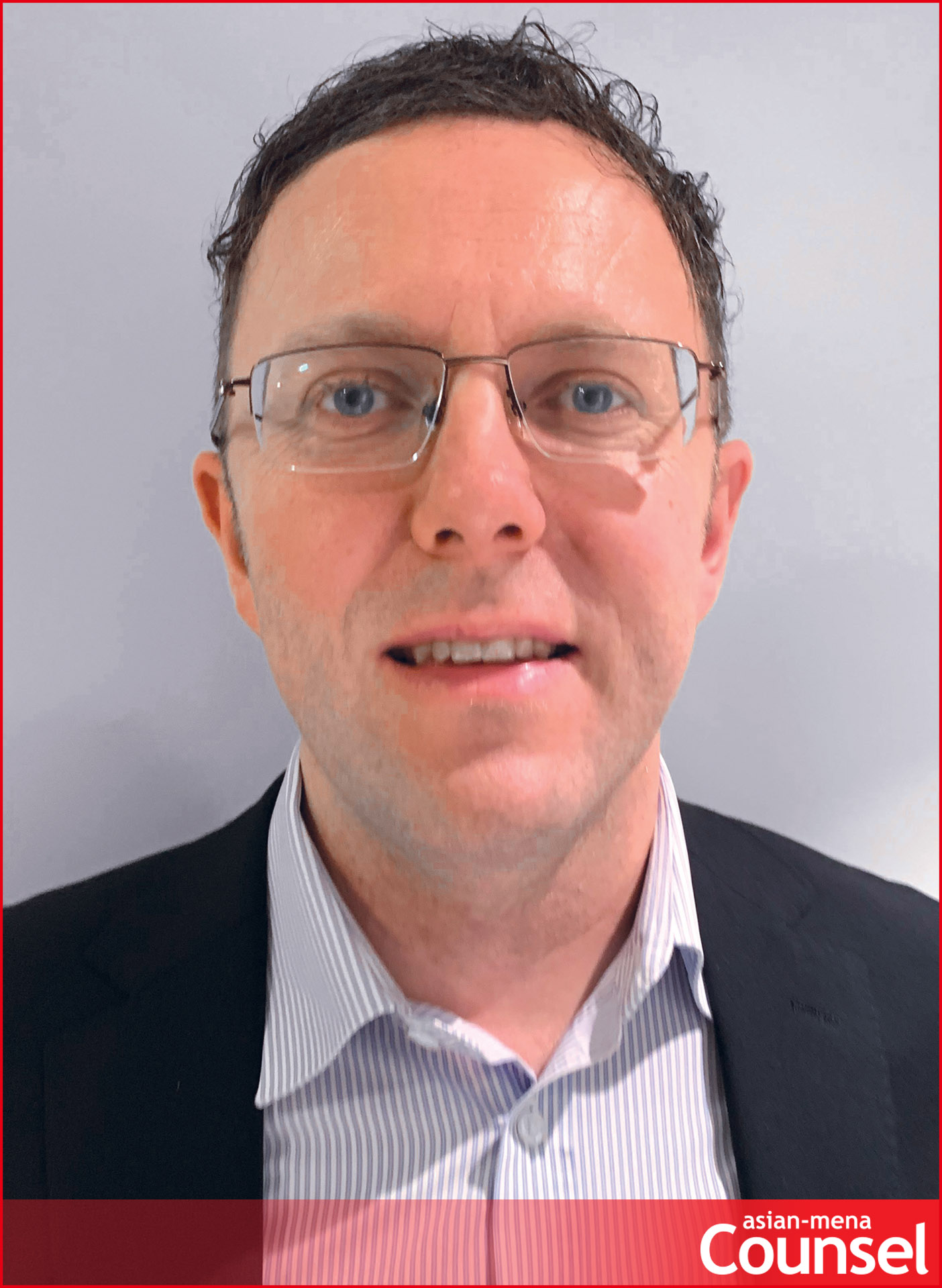
The Lloyd’s Register general counsel for Asia, Middle East and Africa discusses the challenges of his role, the in-house role under Covid-19 and legal podcasts.
Can you describe your professional background and your current role?
I did my LLB in Law with French Language at the University of Glasgow, spending my Erasmus year in Strasbourg, France. I then did a Masters degree in European and International law at the College of Europe, Bruges before doing the Legal Practice Course at the Oxford Institute of Legal Practice. My training contract was with Norton Rose in London from 2004 to 2006, with seats in Brussels and Singapore, before I joined Clyde & Co in their corporate practice. I spent two and a half years there before going in-house and joining Lloyd’s Register in March 2009 as part of the Europe, Middle East & Africa team based in London. I was transferred to Dubai in 2012 in order to set up a number of regional entities and provide a more localised source of legal advice there. This posting lasted five years during which I became area general manager for Middle East & Africa in 2014 and then subsequently general counsel for South Asia, Middle East & Africa in 2016. I then became general counsel for the whole of Asia, Middle East and Africa in 2017, moving to Singapore at the same time.
My current role involves being responsible for the provision of legal services throughout Asia, Middle East and Africa to our business streams of: marine and offshore, energy, business assurance and inspection, and data-digital. As well as commercial law we advise on labour issues; corporate activities; litigation; real estate; IPR; anti-bribery, corruption and compliance (including leading investigations); data protection; sanctions; as well as any other legal issues that arise. In parallel with this we are constantly striving to get closer to the business by means of continuing customer journey exercises and business partner initiatives.
How big is the team you manage and how is it structured?
There are four of us in the Asia, Middle East and Africa team with two lawyers based in Singapore, one in Hong Kong and one in Shanghai. Although we are geographically spread out we have regular team and one-to-one meetings, including purely social calls. The other three lawyers report to me and I report to the group GC Michelle Davies, who is based in London. It’s beneficial for everyone in the team to get as broad an experience in-house as possible and so — although we do tend to specialise in certain regions — I encourage my team to share work so that each lawyer can get experience in each region we cover. In addition, I try to ensure that each lawyer in the team gets experience in a diverse range of legal issues so that we all have as rounded a skillset as possible.
What are the biggest challenges you face in this role?
Geographically, we advise on jurisdictions from Morocco all the way to New Zealand with a variety of legal systems and practices. Culturally, some clients, due to their size and power, have little incentive to amend their terms, which can make it challenging to reach agreement while complying with our commercial requirements. From a commercial perspective, the growing importance of data-digital means that we are focusing on the application of this in our core areas such as shipping. As with all in-house departments, retaining talent and ensuring that there is a career path for everyone is a key area of focus. At the moment Covid-19 is top of everyone’s list of challenges, and advising the business on various aspects such as labour law, force majeure, government policies with respect to insolvency and signing issues is taking a lot of our time. However, all of these challenges make our jobs more interesting and varied, and enable us to demonstrate the value that we add to the business.
What are the most important qualities of a good general counsel?
I think first and foremost is integrity. This is important in any organisation, however Lloyd’s Register prides itself on providing an impartial voice that our customers can trust. Our values can be summarised as: ‘We care, we share, we do the right thing’, and therefore it’s absolutely fundamental that our in-house lawyers and general counsels share that ethos and demonstrate integrity in terms of the decisions and actions we take.
Understanding the business is key to being a successful in-house adviser. We regularly sit in on business meetings across the streams so that we are up to date with their progress, financial results and forthcoming projects, and so that we can understand their worries and concerns. More specifically it’s important to continually meet with and listen to the business so that we can identify areas where we can improve and where our advice can be more focused and tailored to their needs.
Lastly, I think it’s important that general counsels are able to make decisions, and to learn from experience. The business looks to us for advice and not simply to list the possible options open to them. As lawyers sometimes our instinct can be to want every possible piece of information in front of us before forming a conclusion, however, given time constraints and workload this is not always possible and so it’s important to be able to identify the key facts and to make a call based on them.
Has the in-house legal function changed significantly during your career?
I’ve been in-house for 11 years and during that time I think the major change I’ve seen is the legal function getting closer to the business in terms of becoming business partners rather than being a separate function advising on specific issues. Perhaps in the past the focus was more on protecting the business whereas now there is a greater focus on supporting and advising the business with a view to meeting their aims while at the same time ensuring that potential risks and mitigations are understood and form a fundamental part of an overall conversation.
What do you look for in external counsel?
Responsiveness is key, an ability to meet deadlines and keep us in the loop about developments. Another factor is being pragmatic and taking a view, rather than simply quoting the black letter law. Clearly, being flexible on costs is also an important element. We have a list of lawyers who we have used in the past and intend to use going forward, however we are not tied to a panel structure and so often the individual relationships with external counsel means more than the firm they represent.
What type of work do you outsource to external firms?
We tend to only utilise external firms for larger corporate transactions, specialised local matters such as setting up new legal entities in particular countries, or localised litigation and employment matters. We really try to do as much as possible in-house and, where we do go external, we continue to oversee matters and remain accountable for key decisions. We also ensure that we share that advice within the team so that we all have the benefit of it going forward and can add it to our internal know-how.
What advice can you give to young lawyers starting out in their careers today?
I would advise cultivating a skill that will differentiate them from the other lawyers — something to make them stand out from the crowd: for me that was taking a language (French) with my degree. For working in-house my view is that it’s good to keep your skillset as wide as possible so that you have a number of strings to your bow both in terms of jurisdictions and areas of law if possible. Keeping on top of broader commercial and legal issues is very important and something that I’ve found helpful is subscribing to a number of legal/industry podcasts — there are a lot about and some are really excellent.
What are your interests outside of the legal profession?
I have two young children and love spending as much time as possible with them, especially swimming and on our bikes. I love reading and am a big fan of Charles Dickens. I enjoy travelling and feel very fortunate to be based in Singapore, which is a great base to see other countries from. I try to go jogging in the evenings and enjoy playing the guitar and — more unusually — the bagpipes (although I’m not sure that enjoyment is shared by my family)!


